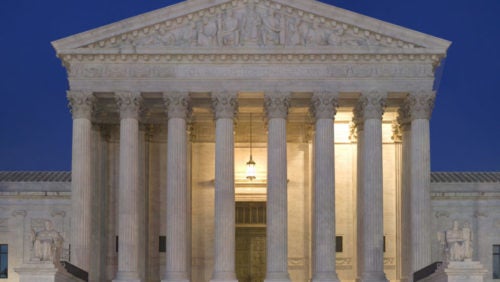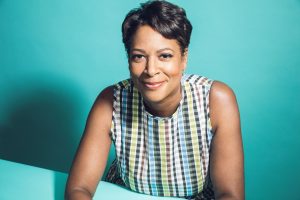Documentarian Dawn Porter, L’93, on Using her ‘Lawyer Brain’ to Analyze the Supreme Court
February 20, 2024

As a law student in the early 1990s, documentary filmmaker Dawn Porter, L’93, walked past the Supreme Court every day on her way to campus.
Those memories of living next to the Court came back often over the last several years as she immersed herself in Supreme Court history and commentary, seeking to understand what led to the current deeply politicized and polarized atmosphere around every confirmation, argument and decision. The result is “Deadlocked: How America Shaped the Supreme Court,” a four-hour documentary series that premiered on Showtime last fall.

Documentarian Dawn Porter, L’93
She’s returning to Washington, D.C. later this week to discuss it with audiences at her alma mater. Porter’s work as a director and producer spans a wide range of subjects, including films on political figures like Congressman John Lewis and First Lady Lady Bird Johnson and “The Me You Can’t See,” a series on mental health for which she collaborated with Prince Harry and Oprah Winfrey. Her latest, “Luther: Never Too Much,” about the late musician Luther Vandross, premiered last month at the Sundance Film Festival.
We spoke with Porter about her thoughts on the state of the nation’s highest court, and how she made the pivot from attorney to filmmaker.
Q: Why did you want to make a documentary about the Supreme Court?
A: I’ve always had – which I think most lawyers have – reverence for the Court and for what it signifies. When I was in law school, I got called for jury duty, and I was so excited. I was probably the only person in the United States of America who was like – “YES!” We as the jury took it so seriously, and debated for hours and hours and hours, and it felt good. It felt like we were really doing what we were supposed to do. And then at the end, we found the person guilty, and then they polled the jury, which is when they ask each juror to say that they affirm the verdict. And that was really hard, to look at somebody and pronounce judgment. That stayed with me, that it’s both a solemn duty and responsibility – and we should treat all court processes that way.
I hope people never lose their reverence for the Supreme Court. I hope they demand of it what it has historically been and what it could be, what it should be. And so I really came to the series with a desire to remind people of why the Court is so important to us and why we can’t just throw up our hands and say, “A pox on all your houses!” We need to be engaged to make it the Court that we want it to be.
Q: You begin the series with an episode focused on Thurgood Marshall’s career and the Brown v. Board of Education case. Why start there?
A: Marshall and his trajectory, his influence on the Court, both as an advocate and as a justice, are really unsurpassed. I could have done four hours on Marshall alone. He had this tremendous impact on civil rights litigation and it was largely through Supreme Court jurisprudence. And so historically, Black people looked to the Court as the place of relief. So it was interesting to me to remind people of that fact – and then, to implicitly note that it is not really that any longer, right?
Q: Another episode covers Roe v. Wade and other issues related to women’s rights. At the events you’re coming to Georgetown for, you’ll likely be speaking to predominantly female audiences, at the Center on Gender Justice and Opportunity and then the Women’s Forum. Do you think the concerns or expectations young women have today about the law or politics are that different from yourself at that age?
A: I expect that they’re probably the same, which is that as women, we want a fair opportunity to have successful careers. We want to have an impact with what we do, and we want the law to safeguard our rights and we want to have respect for the Court.
Q: How did your career evolve from lawyer to filmmaker?
A: I practiced at BakerHostetler for five years, then a partner that I did a lot of work for went to ABC Television, and asked me to go with him. I worked in Standards and Practices – we would investigate the facts, make sure the stories we were reporting were accurate as well as fair. It opened up the process of how you make visual media. And then I did a similar job at A&E Television, and started thinking, “I could do this.” We’ve all had the experience of being a little frustrated with how lawyers are portrayed in fiction or documentary, and I thought maybe I could bring some insight and experience. My first film was “Gideon’s Army,” about three young public defenders, and that’s where it all started.
Q: Would you say that there are parts of your so-called “lawyer brain” that especially come in handy in your filmmaking career?
A: All of the “lawyer brain” is really important. The rigor, the analysis, not being just swayed by your emotion, really understanding your facts and building your stories from there. When you think about what film does and storytelling does, you’re communicating something complicated to an audience – and that’s what I did as a litigator. You’re taking a whole set of facts and you’re telling a story with them and you’re trying to make that compelling. People always say, “Wow, that’s a big shift.” And it hasn’t felt like a big shift to me. It felt like a really natural progression. There’s quite a few of us lawyer-filmmaker people. There are so many ways that you can tap into your creativity. And the lawyer in you never leaves.
For more on Dawn Porter’s documentary projects, visit the website of her production company, Trilogy Films. She will show excerpts from “Deadlocked” at Georgetown Law on Thursday, February 22 at an event hosted by the Center on Gender Justice and Opportunity and participate in the “Hoya Changemakers” keynote panel at the Georgetown Women’s Forum on Friday, February 23.